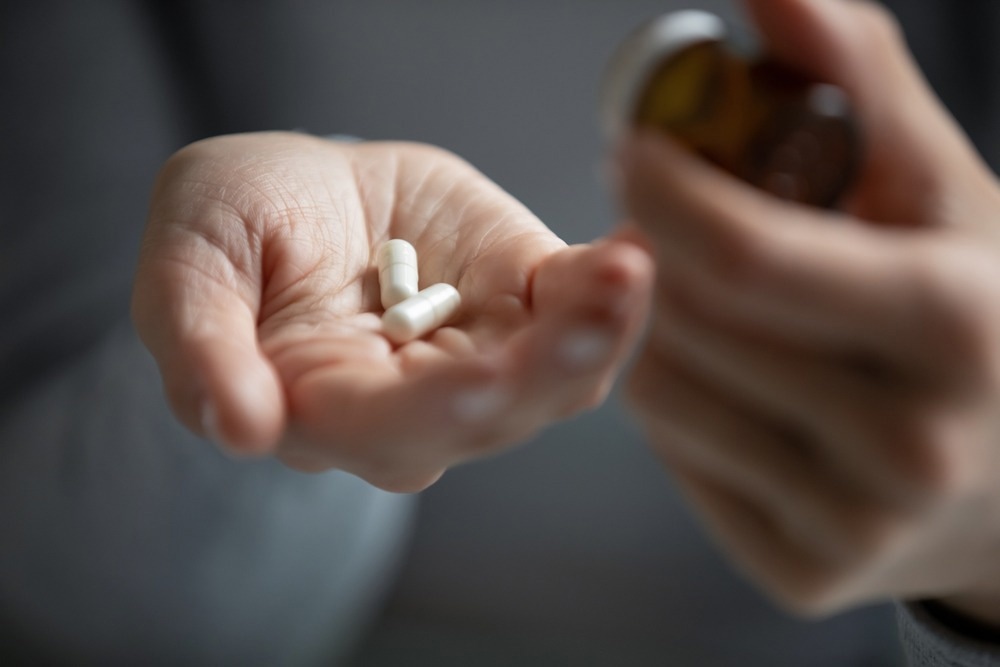In a latest examine posted to the medRxiv* preprint server, researchers carried out a retrospective examine to find out whether or not selective serotonin reuptake inhibitors (SSRI) with immunomodulatory and antiplatelet properties can lower the danger of post-acute sequelae of coronavirus illness 2019 (COVID-19) (PASC).
Research: Assessing the Impact of Selective Serotonin Reuptake Inhibitors within the Prevention of Put up-Acute Sequelae of COVID-19. Picture Credit score: fizkes/Shutterstock
Background
Rising information counsel that roughly one-third of the sufferers who recuperate from extreme acute respiratory syndrome coronavirus 2 (SARS-CoV-2) infections could expertise PASC or lengthy COVID signs.
Numerous signs, together with persistent fatigue, shortness of breath, muscle and joint ache, fever, cognitive impairments, incapability to train, lack of style and odor, and different issues of the cardiovascular, nervous, digestive, and renal methods have been reported by PASC sufferers.
Whereas the pathophysiology stays unclear, hypothesized mechanisms embody immune dysfunction, viral reservoirs, hormone dysregulation, and the formation of microclots.
Research with animal fashions and in vitro and medical experiments counsel that SSRIs have immunosuppressive and immunomodulatory properties that may cut back the medical outcomes of COVID-19 and the danger of PASC. The binding of SSRIs to the sigma-1 receptor (S1R) within the endoplasmic reticulum is assumed to cut back the activation of pro-inflammatory cytokines akin to tumor necrosis factor-alpha (TNFα) and interleukin-6 (IL-6).
Managed trials with fluvoxamine, an SSRI, have proven proof of safety in opposition to the cytokine storm elicited throughout extreme COVID-19. Subsequently, the potential of SSRIs to cut back the danger of PASC via down-regulating pro-inflammatory responses must be examined additional.
Concerning the examine
Within the current examine, the researchers used anonymized digital well being data from the Nationwide COVID Cohort Collaborative (N3C) repository consisting of knowledge on diagnoses, procedures, medicines, lab exams, and demographic elements.
People aged 18 years or above with a optimistic reverse transcription polymerase chain response (RT-PCR) or antigen take a look at or an Worldwide Classification of Ailments, Tenth Revision, Medical Modification (ICD-10-CM) analysis code of U07.1 for COVID- 19 have been included within the examine. Solely sufferers with an index date between October 1, 2021, and April 7, 2022, have been thought-about for the examine.
Two publicity teams have been outlined primarily based on baseline publicity to a minimal of 1 SSRI with and with out agonist exercise at S1R. The third group was the management group with no baseline publicity to both sort of SSRI. The measured main end result was the analysis of PASC utilizing a studying algorithm skilled on sufferers with identified PASC.
Statistical analyzes in contrast sufferers receiving SSRI therapy with and with out S1R agonism to sufferers with out publicity to any SSRIs. Moreover, the person publicity propensity scores have been evaluated individually for varied elements akin to demographic elements, physique mass index, a variety of comorbidities, earlier SARS-CoV-2 infections, immunotherapy for COVID-19, exposures to different S1R binding ligands or baseline serotonin and norepinephrine reuptake inhibitors (SNRIs), baseline antidepressant, benzodiazepines, or antipsychotic medicines, and COVID-19 vaccinations.
outcomes
The outcomes reported a 26% discount within the relative threat of PASC amongst sufferers receiving baseline SSRIs with S1R agonism in comparison with the management group receiving no SSRI therapy. The relative threat of PASC amongst sufferers receiving non-S1R agonist SSRI therapy additionally confirmed a 25% discount in comparison with the management group.
Moreover, when the sufferers receiving S1R agonist and S1R non-agonist baseline SSRI remedies have been in contrast, no vital change in relative threat was noticed, indicating that the protecting results of SSRI in opposition to lengthy COVID signs may not be associated to S1R agonism. The authors speculated that the mechanism via which SSRIs cut back the danger of PASC might be associated to their immunomodulatory properties or their antiplatelet exercise, which may impression the microclots that contribute to PASC pathology.
The examine additionally indicated a decreased threat of extreme medical outcomes and hospitalization amongst sufferers who have been administered fluvoxamine or different SSRIs within the early phases of COVID-19.
conclusions
To summarize, the examine investigated the impression of SSRIs on the relative threat of PASC by conducting a retrospective evaluation of information from sufferers who acquired S1R agonist and S1R non-agonist baseline SSRI remedy.
General, the outcomes reported a 26% and 25% discount within the relative threat of PASC amongst sufferers who acquired baseline SSRI therapy with and with out S1R agonist exercise, respectively. The findings urged that the mechanism via which SSRIs cut back PASC signs and threat isn’t associated to S1R agonism however might be related to the antiplatelet and immunomodulatory properties of SSRIs. The outcomes spotlight the necessity for extra medical trials to discover using SSRIs in COVID-19 therapy to cut back the event of PASC.
*Essential discover
medRxiv publishes preliminary scientific experiences that aren’t peer-reviewed and, due to this fact, shouldn’t be thought to be conclusive, information medical apply/health-related habits, or handled as established data.

